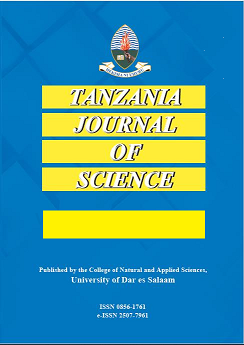Seasonal variation and nutrient levels influence phenolic contents in seagrass Thalassia hemprichii along Dar es Salaam coast
Keywords:
Phenolic content, Thalassia hemprichii, Seagrass, Press 'enter' after each term.Abstract
Seasonal variation in total phenolics in Thalassia hemprichii from four different sites with varied nutrient loading along Dar es Salaam coast was studied. Besides few studies existing on phenolics in seagrass species done to assess status of the seagrass meadows, there is paucity of information for seagrass species along the coast of Indian Ocean in Dar es Salaam. In this study, Thalassia hemprichii shoots were collected from four different sites having different levels of anthropogenic pressure during dry and rainy seasons. The total phenol contents of above and belowground parts of the seagrass were determined using Folin-Ciocalteu method. Results indicates significant differences in total phenol from different sites in both above and below ground tissues, ranging from 2.7 to 35.7 µgGAE/mg and 1.9 to 142.9 µgGAE/mg, respectively. The highest concentration of total phenol during dry season was recorded in samples collected from Kunduchi site and the lowest being at Oysterbay site. Similarly, during rainy season significant variation in concentration of total phenols were observed among sites ranging from 2.3 to 26.4 and 12.7 to 77.0 µgGAE/mg for above and belowground parts, respectively. Generally in all sites, a significant higher concentration of total phenol in the belowground parts was observed than in the above ground parts in both seasons and was higher in dry than in rainy season. There was negative correlation between concentration of phenol in the tissues of seagrass and the concentration of nutrients in water. Our finding shows that variation in seasons and nutrient levels influence the accumulation of phenolic compounds in the studied seagrass. Thus phenol content could be used as early warning biological marker for assessing the status of seagrass meadows subjected to multiple environmental pressures


